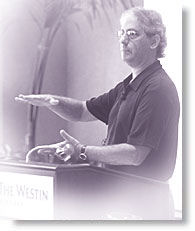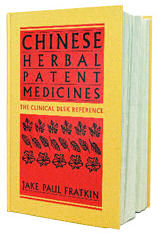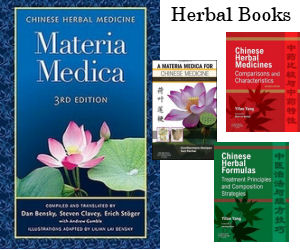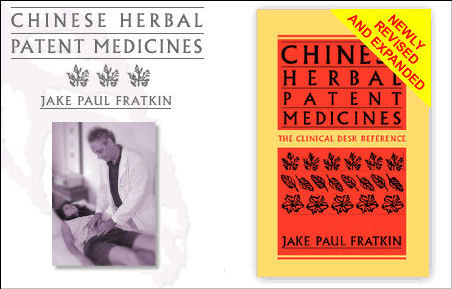Acupuncture & TCM Articles

Articles by Jake Paul Fratkin, OMD, LAc
Jake Fratkin, OMD, LAc, has been in the practice of Oriental medicine since 1978. Following undergraduate and graduate training at the University of Wisconsin in Chinese language and philosophy and pre-medicine, he pursued a seven-year apprenticeship in Japanese and Korean style acupuncture with Dr. Ineon Moon and a two-year apprenticeship in Chinese herbal medicine with Drs. Zhengan Guo and Pak-Leung Lau in Chicago. He also spent a year in Beijing hospitals interning in advanced herbal medicine, specializing in gastrointestinal and respiratory disorders, and pediatrics.  Dr. Fratkin is the author of several books, including Chinese Herbal Patent Medicines: The Clinical Desk Reference, and is the editor-organizer of Wu and Fischer's Practical Therapeutics of Traditional Chinese Medicine. In 1999, he was named the "Acupuncturist of the Year" by the American Association of Oriental Medicine.
Dr. Fratkin is the author of several books, including Chinese Herbal Patent Medicines: The Clinical Desk Reference, and is the editor-organizer of Wu and Fischer's Practical Therapeutics of Traditional Chinese Medicine. In 1999, he was named the "Acupuncturist of the Year" by the American Association of Oriental Medicine.
Chinese Herbal Patent Medicines: The Clinical Desk Reference
Hardback book, 1198 pages. This volume covers 1360 products, including 550 GMP level products and all of California FDB analysis on 505 products. Includes information on endagered animals, heavy metals, and pharmaceuticals. The text is organized into 12 groups, with a total of 109 chapters and includes material by Andrew Ellis, Subhuti Dharmananda, and Richard Ko. Over 80 pages of full-color photos (with English and Chinese cross-reference). Fully indexed.
LEAKY GUT SYNDROME: A Modern Epidemic
Part 2: Diagnosis and Treatment
In Part 1 of this article, we discussed the causes of Leaky Gut Syndrome. To review, repeated use of antibiotics create dysbiosis in the small and large intestines, allowing the proliferation of pathogenic fungi while reducing or eliminating over 500 species of beneficial bacteria. These beneficial bacteria are required for digestion and absorption of food and nutrients, and neutralization of toxic waste products. Candida albicans, a toxic fungus, produces a caustic aldehyde which irritates the epithelium of the small intestine, allowing absorption of microbial and metabolic toxins. These toxins overwhelm the liver, allowing toxic accumulations in the lymphatic fluids and deposits into the connective tissue, causing symptoms of fatigue, fibromyalgia, headache, poor concentration, and certain skin conditions, including eczema and urticaria. I believe that Leaky Gut accounts for 50% of chronic illness in the modern clinical practice.
The complicating factor in Leaky Gut Syndrome is that of acquired food allergies. As the intestinal mucosa is irritated by Candida, foods are absorbed before they are completely digested. The body can tag these as foreign by using specific antibodies. When those foods are eaten there is an inflammatory response at the intestinal epithelia, which keeps Leaky Gut going. If Candida is effectively eradicated but the food allergy problem is not addressed, the various illnesses will continue.

Dietary Restrictions.
The clinician is best served by utilizing laboratory tests to confirm and gauge various aspects of Leaky Gut including Candida levels, digestive function, food allergies, etc. Many of the tests are expensive and one needs to be prudent in what tests are absolutely required.
If testing is out of the question due to cost restrictions, certain assumptions and advice may be given to the patient. If there is a history of antibiotics (two episodes within a lifetime is enough to set up Leaky Gut Syndrome; yearly doses of antibiotics will guarantee it), assume there is Candida. You will need to give anti-Candida medicines and advise a special diet. Diet therapy alone will not eradicate high levels of Candida, but certain foods will sabotage successful therapy: sugars, yeasts, refined white flour products (bread, pasta, pastry), vinegar, fermented products including miso, canned fruit juice, and dried fruit. Fresh fruit may or may not be a problem, depending on the severity.
Secondly, assume there are food allergies. If any food allergy is allowed to persist, the intestinal wall will remain inflamed and toxic absorption will continue. Without testing, the best you can do is avoid completely the common allergenic foods: dairy (milk, cheese, cottage cheese, yogurt, ice cream, butter), gluten grains (wheat, rye, oats, spelt, barley); eggs; corn (including popcorn, corn syrup, corn oil); and beans (especially soy, lentil and kidney; soy includes tofu, miso, and tamari). Other foods that commonly test as allergenic are almonds, peanuts, and garlic. The most common of the allergenic foods are dairy, gluten grains, and eggs. Be careful of these ingredients in packaged foods or foods prepared in restaurants.
A non-allergenic diet can be obtained by eating meat, chicken, fish, vegetables, potatoes, rice, millet, and fruits. Many patients feel that certain foods are allergenic because of reactive symptoms. We have to distinguish sensitivity from allergy. A food that might cause sensitivity, like tomatoes or oranges, causes discomfort because of an imbalance of digestive acids and enzymes. Real allergies cause damage to the intestinal lining by initiating an inflammatory reaction, and ironically, are usually without any perceived reaction.
Diet is perhaps the hardest path for patients to follow, but this is what determines who gets better and who doesn´t. Your management and encouragement here is essential to a real success. Patients need to understand that allergenic foods keep the intestines inflamed, allowing toxins to continuously enter the body.
Useful Laboratory Tests.
Most of the pertinent tests require a stool sample, and kits can be provided directly by the practitioner to the patient. Food allergy tests require a serum sample, which is performed by a registered phlebotomist or lab, who gives the spun serum back to the patient to mail.
As far as useful tests, I think it is essential to assess the level of Candida infestation. Low levels do not require aggressive anti-Candida treatment, whereas high levels do.The blood antibody test for Candida is not very useful as it tends to show only in the severely immuno-suppressed, such as AIDS patients. The better Candida tests use a stool sample, and I would recommend either Great Smokies (Asheville) or Diagnos-Techs (Seattle).
Leaky gut can also be caused or aggravated by pathogenic bacteria and protozoans, especially those acquired in the tropics, particularly India and southeast Asia. Both Great Smokies (using the CPx1) and Diagnos-Techs (using the CH panel) and do a good job here.
The next test I often order is the Chymotrypsin level. This is a digestive enzyme produced by the pancreas, and is a good global indicator for pancreatic function. Many symptoms that look like Leaky Gut may actually be stomach-pancreas deficiency, without Candida or intestinal permeability damage. Chymotrypsin deficiency indicates relative spleen qi deficiency. By measuring the Candida and Chymotrypsin levels first, one can infer or rule out Leaky Gut. If both tests are normal, it is an unlikely diagnosis. If they are abnormal, I usually go on to recommend food allergy testing.
There are other tests that are useful. ACHY (anti-chymotrypsin factor) is measured in the stool and is a direct marker for small intestine inflammation; it often indicates food allergies. However, in a chronic case where the immune system has plummeted, the ACHY can look normal. This means that the immune system is too depleted to mount an adequate defense at the site of the mucosal membrane.
Secretory IgA (SIgA) is a direct marker of the patient´s immune system at the site of mucosal lining of the small intestine, also measured by stool. I have reduced the usage of this test, because all patients with Leaky Gut syndrome seem to have a severely low level; I have come to assume that it will be low. However, as far as educating the patient and getting compliance, this is a good test for the patient to see.
Great Smokies provides an intestinal permeability test. The patient drinks a liquid containing two measurable sugars, followed by the collection of urine for 24 hours. It accurately shows the degree of Leaky Gut. Again, it is helpful for patient education and compliance, as well as making your case with medical doctors.
The final test that is important is a good food allergy panel. The skin prick test for allergens only shows IgE levels, the immediate reactions. Most food allergies are delayed reactions, and require testing of the IgG levels through blood serum. This is a new test, about seven years old, and very few medical doctors know of it except those using natural approaches.
Currently, four labs offer a combined IgE/IgG test that I know of. (See the listing at the end of the article). For years I have successfully used the General Food Panel from National Biotech in Seattle, which returned the results within ten days. They have recently been acquired by Great Smokies, who now offer a comprehensive panel.
The advantage of a lab food allergy test is that they appear accurate based on dramatic improvements in the clinical picture. Further, seeing a paper print out of one´s allergies is quite reinforcing to the patient. There are practitioners who do machine or muscle testing of food allergies, and this is quick and inexpensive. However, they do not seem to distinguish true allergens from sensitivities.
In any event, I recommend that you call the laboratories to obtain their excellent practitioner educational materials and study them carefully. They have many useful tests that can aid your clinical practice, including hormone profiles from saliva samples.
Treatment.
Treatment of Leaky Gut Syndrome is complex and multi-layered. Most acupuncturists are overwhelmed by the multiple patterns that coexist in a Leaky Gut case. They don´t know where to begin or how to organize signs and symptoms. First of all, identification and elimination of Candida and food allergens is essential to any real success, and can coexist with any of the zang fu patterns. The next overall approach is to prioritize which zang fu to begin working with: liver, spleen, kidney, or heart. They may all be involved, but if you treat all simultaneously, the patient will suffer from a confused and inefficient approach. In the absence of true disturbed shen presentation, it is usually best to start herbal therapies with liver, then spleen, and finally, kidney.
Candida.
Treating Candida can be a big challenge. Funguses are survivors and they are very hard to get rid of. Their job is to suck the life out of decaying tissue, so a fundamental imbalance in the vitality and chemistry of the small intestines is often the root cause. Addressing proper pH and restoring vitality via herbs and dan tian qi gong, are useful. When the Candida levels are +4 or +5 (on a scale of 1 to 5), it may be necessary to use western prescription medicine, specifically Nystatin. When combined with an anti¬Candida diet, Nystatin is usually effective but needs to be taken for four months. The recommended protocol is 500,000 unit tablets, slowly working up to 1 to 2 tablets, 3 x day. Other western medicines, such as Nizoral, Diflucan, an Sporex, are effective but can be toxic to the liver. Without western medicine, it can take up to nine months or longer to eradicate +4 Candida with natural medicines.
For levels of +3 or below, many natural products will work. The key is to change any anti-fungal product every month, to avoid tolerance and adaptation. Herbally, Huang Lian Jie Du Pian seems to do the trick. I can also recommend my own formula:
FRATKIN´S CANDIDA FORMULA %
Atractylodes Bai Zhu - 6 %
Codonopsis Dang Shen - 9 %
Pinellia Ban Xia - 9 %
Coptis Huang Lian - 9 %
Phellodendron Huang Bai - 9 %
Houttuynia Yu Xing Cao - 9 %
Isatis Ban Lan Gen - 6 %
Cinnamomum Rou Gui - 6 %
Amomum Sha Ren - 4 %
Coix Yi Yi Ren - 6 %
Artemisia Yin Chen Hao - 6 %
Poria Fu Ling - 9 %
Melia Chuan Lian Zi - 6 %
Mume Wu Mei - 6 %
Naturopathic products that work include those made with grapefruit seed extract, oregano oil, undecylenate acid, and berberine herbs. Again, talk to the reps of the various companies (listed at the end of the article) for ideas. For children there are a number of homeopathic nosode products that are quite effective from Professional Health Products (PHP), NutriWest, and others.
Most patients will require supplementation with beneficial bacteria to restore probiosis, the healthy bacterial terrain of the small and large intestine. Supplements combining various strains of lactobacillus are helpful, although quality really can vary depending on the manufacturer. Most should be refrigerated, and taken without food. New evidence points to Lactobacillus Sporogenes as being particularly effective, and a children´s chewable exists. Contact Marcopharma for information.
Liver Patterns.
In Leaky Gut, the intestines have been dumping unnatural amounts of microbial or metabolic toxins into the blood, which quickly end up in the liver. This causes stagnation of qi and blood leading to heat with a reduced ability to clear toxins. It is ultimately the cause of fibromyalgia, because the toxins that the liver cannot neutralized are returned to the blood, then the lymph, and finally the connective tissue.
I feel that the first zang fu organ needing regulation in Leaky Gut is the liver, requiring formulas that move qi, invigorate blood, and clear heat. Try to determine if liver stagnation is affecting either the stomach or the menses. If it is affecting the stomach with symptoms of food stasis, bloating, costal distension, or poor digestion, use Chai Hu Shu Gan Tang, Xiao Chai Hu Tang, or the patent medicine Shu Gan Wan. If the pattern is causing gynecological symptoms including PMS, dysmenorrhea or menstrual irregularity, use Jia Wei Xiao Yao San. Patent medicines or American made Chinese herbal products are quite adequate here.
If the pattern indicates heat toxins in the liver, with symptoms of fatigue, lymphatic swelling, and low grade fever, it is helpful to add herbs or formulas that clear heat toxins. The patent medicine Chuan Xin Lian contains Andrographis Chuan Xin Lian, Taraxacum Pu Gong Ying, and Isatis Ban Lan Gen. It is quite effective in targeting the liver and lymphatics.
There are other naturopathic products that help clear liver congestion. Every company has their favorites, and you can read their literature or talk with their reps. My personal favorites include the following: Hepar Comp or Hepeel (Heel-BHI); Core Level Liver or Core Level Detox (NutriWest); Detoxifying Factors (Tyler); Hepatica (Marco Pharma).
Spleen Patterns.
The spleen is responsible for repairing the intestinal lining of the small intestine, and prolonged Leaky Gut easily depletes spleen qi. This can be noticed with traditional TCM signs and symptoms, or by the Chymotrypsin enzyme test. If spleen deficiency and liver stagnation coexist, choose a formula that addresses both, such as Chai Hu Shu Gan Tang, Ginseng Stomachic Pills (Zi Sheng Wan) or Shu Gan Wan. In such cases, there will often be food stagnation. If all signs of excess are gone with signs of a weak or small pulse, tonifying the spleen is required. You can use Si Jun Zi Tang, Xiang Sha Liu Jun Zi Tang or Shen Ling Bai Zhu Tang.
Naturopathic approaches often include hydrochloric acid (HCL) and pancreatic enzyme support. HCL-pepsin capsules are good, taking one to two capsules with each meal. It will not rehabilitate the pancreas like Chinese herbs, but it can promote efficient digestion while the spleen-pancreas is recovering.
Critical to the success of a leaky gut case is repair of the intestinal mucosa. If one can stop the irritating factors, namely fungus, protozoa, food allergies, and non-steroidal antiinflammatories like ibuprofen, the intestinal lining will heal by itself, although slowly. Use of the spleen qi tonics mentioned above will help to repair the lining, as will certain naturopathic products including ginkgo, slippery elm, aloe vera, bioflavonoids such as quercetin, essential fatty acids, antioxidants, and the amino acid glutamine.
As for Chinese herbs to repair intestinal inflammation, I have used the following formula:
FRATKIN´S INTESTINAL INFLAMMATION FORMULA %
Astragalus Huang Qi - 12 %
Dioscorea Shan Yao - 9 %
Ginseng Ren Shen - 9 %
Paeonia Chi Shao - 9 %
Glycerrhiza Gan Cao - 5 %
Cimicifuga Sheng Ma - 6 %
Coptis Huang Lian - 9 %
Pulsatilla Bai Tou Weng - 9 %
Benincasa Dong Gua Pen - 9 %
Cyperus Xiang Fu - 9 %
Sanguisorba Di Yu - 9 %
Lotus Lian Zi - 5 %
Kidney patterns.
Prolonged or chronic Leaky Gut Syndrome invariably causes kidney deficiency, and kidney tonification is often given after excess patterns have been addressed. Kidney is responsible for the endocrine system and, along with Spleen, for the immune system. When the body needs reserves, it uses kidney energy, stored in the Eight Extraordinary Channel network. In western physiology this includes adrenal function. As adrenal energy is depleted, other endocrine glands also become depleted, especially thyroid and pituitary, causing a myriad of symptoms. The naturopathic approach is to provide glandular support of adrenal or thyroid, which often has a positive therapeutic effect. However, in early stages of Leaky Gut, adrenal supplementation is contraindicated. This is because from a TCM point of view, the kidney yin depletes first, and later kidney yang. Adrenal glandulars basically tonify kidney yang. It is preferable to intervene early with supplementation of kidney yin through formulas like Liu Wei Di Huang Wan or Zhi Bai Di Huang Wan. This is determined through pattern differentiation. Later on, kidney yang tonics may be needed, such as Jin Kui Shen Qi Wan or You Gui Wan. In individuals with depleted kidney qi, stronger tonics are needed. I have found that placenta (Zi He Che ) is quite useful, as is Siberian ginseng (Wu Jia Shen), royal jelly (Feng Wang Jiang), Cordyceps (Dong Chong Xia Cao), and deer horn (Lu Pong).
Occasionally, there are some useful naturopathic products for adrenal deficiency due to kidney yin deficiency. In these cases, from a western physiological point of view, cortisol levels are elevated as confirmed by saliva tests. These products would include Core Level Auto Para and DSF Formula (NutriWest). When cortisol levels are depleted, supplementation with adrenal products is beneficial.
Heart and Shen Patterns.
It is not uncommon to find disturbed shen patterns as the predominant presentation, marked by insomnia or restless sleep, anxiety, easily frightened, or palpitations. These are the cases that are often treated with Prozac or other antianxiety or antidepressive medications. Chinese herbal medicine is quite effective here. The formulas that I use most often are the following: Tian Wang Bu Xin Dan, An Mian Pian, and Bai Zi Yang Xin Wan. Occasionally Chai Hu Mu Li Long Gu Tang is appropriate.
Acupuncture Protocols.
In Chinese acupuncture, regulation of Liver and Spleen is often the predominant protocol, and using points such as Liv 3, St 36, and Ren 12 is helpful as a foundation formula. In Japanese Meridian Therapy, liver deficiency is the most common presentation, with treatment at Liv 8 and Ren 12 being effective. Ion pumping cords for the Chong Mai (PC 6-SP 4) is often indicated, or at Ren Mai (Lu 7- Ki 6). Supportive moxibustion at Sp 3, St 36, and St 27 is potent for healing an irritated intestinal lining. I would recommend acupuncture treatments once or twice a week, especially for the first two months of treatment.
Prognosis.
If the patient can stay on an allergy free diet, recovery is possible within four or five months using the types of therapy indicated above. However, some patients may need up to nine months of treatment for complete recovery if they have depleted their energy reserves. All sources of stress must be addressed and minimized, including emotional, lifestyle, work, and climate exposure. What I have proposed here focuses on the physical stress of massive toxic overload from the intestines. Leaky Gut Syndrome at its heart is auto-toxicity. The need is to rehabilitate the selective barrier of the small intestinal wall, detoxify the body, and restore liver, spleen and kidney functions.
SOURCES FOR MEDICINES
1) Chinese Herbal Medicines
CHINESE PATENT MEDICINES
MAYWAY (800) 262-9929
NUHERB (800) 233-4307
GOLDEN FLOWER (800) 729-8509
HEALTH CONCERNS (800) 233-9355
HERBAL TIMES (800) 233-4307
JADE PHARMACY (800) 827-4372
K´AN HERB COMPANY (800) 543-5233
KPC (SOUTH MOUNTAIN) (800) 572-8188
MINTANG FORMULAS (800)888-9998
PLUM FLOWER (800)262-9929
QUALIHERB (800) 533-5907
SEVEN FORESTS (800)544-7504
SUN TEN FORMULAS (800)333-4372
MCZAND HERBAL, INC. (800)800- 0405
2) NATUROPATHIC PRODUCTS
AMERICA´S BIO-PLUS (800) 498-6640
ALLERGY RESEARCH GROUP (800) 545-9960
BIOTICS-DSD, INC. (800) 232-3183
ECLECTIC INSTITUTE, INC. (800) 332-4372
EMERSON ECOLOGICS (800) 654-4432
HEEL-BHI (800) 621-7644
INTERPLEXUS (800) 875-0511
METAGENICS WEST, INC. (800) 321-6382
MARCO PHARMA INT., INC. (800) 999-3001
NATREN (800) 992-3323
NUTR. ENZYME SUPPORT SYS. (800) 637-7893
NUTRI-WEST (800) 443-3333
PERQUE (703) 758-0689
PROBIOLOGIC (800) 678-8218
PHYTOTHERAPY RESEARCH (800) 274-3727
RAINBOW LIGHT (800) 227-0555
STANDARD PROCESS WEST (800) 321-9807
THORNE RESEARCH, INC. (800) 228-1966
TYLER ENCAPSULATIONS (800) 869-9705
UAS LABS (800) 422-3371
3) LABORATORIES
GREAT SMOKIES DIAG. LAB (800) 522-4762
DIAGNOS-TECHS, INC (800) 818-3787
SERAIMMUNE PHYSICIANS LAB (800) 533-5472
MERIDIAN VALLEY LABS (800) 234-6825
For a more thorough background see:
DIGESTIVE WELLNESS, Elizabeth Lipski, Keats Publishing, Inc., 1996
Digestive Wellness
DETOXIFICATION & HEALING; Sidney MacDonald Baker, Keats Publishing, Inc., 1997
Detoxification and Healing: The Key to Optimal Health
THE FOUR PILLARS, Leo Galland.
The Four Pillars of Healing: How the New Integrated Medicine- -the Best of Conventional and Alternative Approaches- - Can Cure You
GREAT SMOKIES DIAGNOSTIC LAB: Physician Information
 
|
